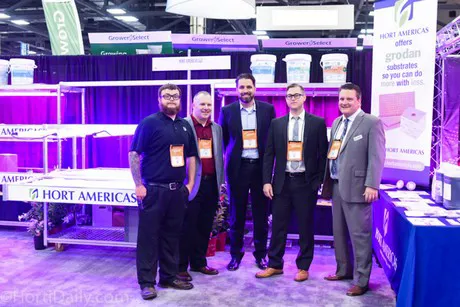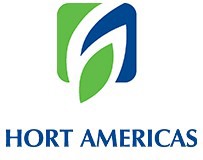 When Chris Higgins and his partners founded Hort Americas in 2009, they never expected that their business would become one of the most important suppliers to the burgeoning controlled environment agriculture industry in North America.
When Chris Higgins and his partners founded Hort Americas in 2009, they never expected that their business would become one of the most important suppliers to the burgeoning controlled environment agriculture industry in North America. Hort Americas started as a partnership between a small group of young American entrepreneurs and Horticoop, one of the largest suppliers to the Dutch horticultural industry. "At that time we assumed that majority of our customers would be dutch-style greenhouse producers of ornamentals, vegetables and other niche crops", said Chris. "We knew our businesses would change over time, but we never expected that our business model would change so quickly and shift in so many different directions."
Locally Grown Produce
Chris points to the growth they saw on the food side, as a result of the upcoming local food movement. "Seven years ago, locally grown produce was not nearly as important as it is today. At that time our largest customers were mainly growers of flowers and plants. As locally grown food became more important to both consumers and producers, we gladly welcomed a new-type of customer focused on growing leafy greens and culinary herbs at a very rapid pace."Nowadays, producers of locally grown food crops, whether they grow in high tunnels, advanced hydroponic greenhouses or in vertical farms without sunlight, are considered to be among Hort Americas' quickest growing list of new clients. Chris is also quick to add that, "we're very happy to see that we still experience a lot of positive growth on the floriculture side, especially within the orchid industry. These growers are highly valued by us and are a very important customer base for our business. But on the food side, it is very good to see that a fair percentage of the customers we are working with nowadays did not exist in 2009."
Chris explained that he and his team enjoy being part of this new and young industry. "The U.S. consumer's desire to know where their food comes from is more popular than ever and made the locally grown food movement gain a lot of steam. It gave small family farmers a lot of opportunities to reinvent themselves, but also created a new younger generation of entrepreneurs who through technology have found ways to be involved in farming and the agriculture industry.”
The local food movement created opportunities for these young agripreneurs to enter the highly competitive North American ag-industry. “It's exciting to see people excited about horticulture and agriculture. They are encouraged to see opportunities in urban settings. Futhermore they are encouraged to see their ag dreams become possible based on the amount of startup capital needed to invest in a farm with a month to month lease. We enjoy working with all of these entrepreneurs, providing them with technology, supplies and the highest possible level of knowledge and support."
Legalization (The Elephant in the Room)
On the other hand, another event that caused a slight shift in the business model of Hort Americas, was the legalization of marijuana throughout the United States. In certain states a lot of the 'would be' local food and flower growers started to grow marijuana. Some in warehouses others in their traditional greenhouses.“Regardless of our personal feelings on the topic, this has changed the landscape of our industry. We are not, and will not, re-build our company to focus specifically on the legal production of cannabis, but as more and more states continue to allow legal production and as this part of the horticulture industry becomes more mature and professional our paths will surely continue to cross."
Chris explained that there are currently high tech cannabis operations using the same type of technologies and strategies as certain vegetable growers. "It's common sense that we will be asked to help supply them with their equipment and supplies. But, we are a b2b wholesale supplier, we will follow the laws as they apply to us and only consider these opportunities when we're approached by legal business entities. We will not specifically focus on the crops they grow, but we will focus on their business and the needs they have, the same as we do with our general CEA and horticulture customers. As long as it is legal, we cannot determine what type of crops our customers produce. We do however want to make sure that all of our grower customers are acting responsibly and producing sustainably."
While the boost of the local food movement lost some momentum initially in the states when legalization of medical marijuana came on the ballot, Chris definitely sees them quickly returning. "Especially in the North East and in the Pacific North West of the United States we see many new farms starting to produce locally grown vegetables. These growers are typically smaller (less than 1 acre) and rely on us for many of their supplies, especially those products that are produced in Europe."

At the Cultivate trade show in Columbus last month, the Hort Americas team showcased some new additions to their catalog; they have now added GE and Sharp LED products, the whole range of Sudlac advanced shading agents plus CEA Advisors' Growracks.
Expertise
Hort Americas profiles itself as a supplier with an emphasis on high level technical expertise in a few areas of business. "Lighting, substrates and fertilizers are three product categories that we can, and must, talk about at a very high level. From LED grow lights to a wide range of growing media as well as both organic and conventional fertilizers, all products that require an advanced level of knowledge. It's our goal to sell them with the highest level of support as possible."As a result of that emphasis on expertise, Hort Americas soon became a well known name in the North American CEA industry. They are now working with and being approached by many individuals and companies that have plans to get into controlled environment agriculture. Chris explained that those having success within this new wave of CEA entrepreneurs often have small business backgrounds as well as ties to the traditional horticulture or agriculture industry.
"Some of them have a background in landscaping, others in farming, but all of them know or want to learn what it takes to grow a high quality crop consistently. They know that it is important to see technology like a vertical farm only as a tool to achieve this, not as the end goal. These are the kind of growers that not only know how to create a successful ag-tech business, but more important: they feel obliged to change the way the world produces its food."
Ultimate Vision
Chris concluded by saying that it is also Hort Americas' ultimate vision to contribute to a more sustainable horticulture/agriculture industry. They plan on doing this through education, by promoting sound science and by helping their customers to grow effectively and efficiently."We truly believe that there is not just one solution that will solve all of the present day problems we have globally in agriculture. A greenhouse or vertical farm does not answer all our questions, but controlled environment agriculture can definitely help to grow crops more sustainably. In order to do this we must look at the geography we are farming and at the natural resources available to us in those locations. From there we must create plans that allow us to produce the widest variety of crops more sustainably. We must always have a strong commitment to reducing our environmental impact, work well within our communities and focus on providing the essentials for healthy lifestyle and diet. It's not about owning that vertical farm or greenhouse, it's about creating positive change."
 For more information:
For more information:Hort Americas
Chris Higgins
chiggins@hortamericas.com
www.hortamericas.com
